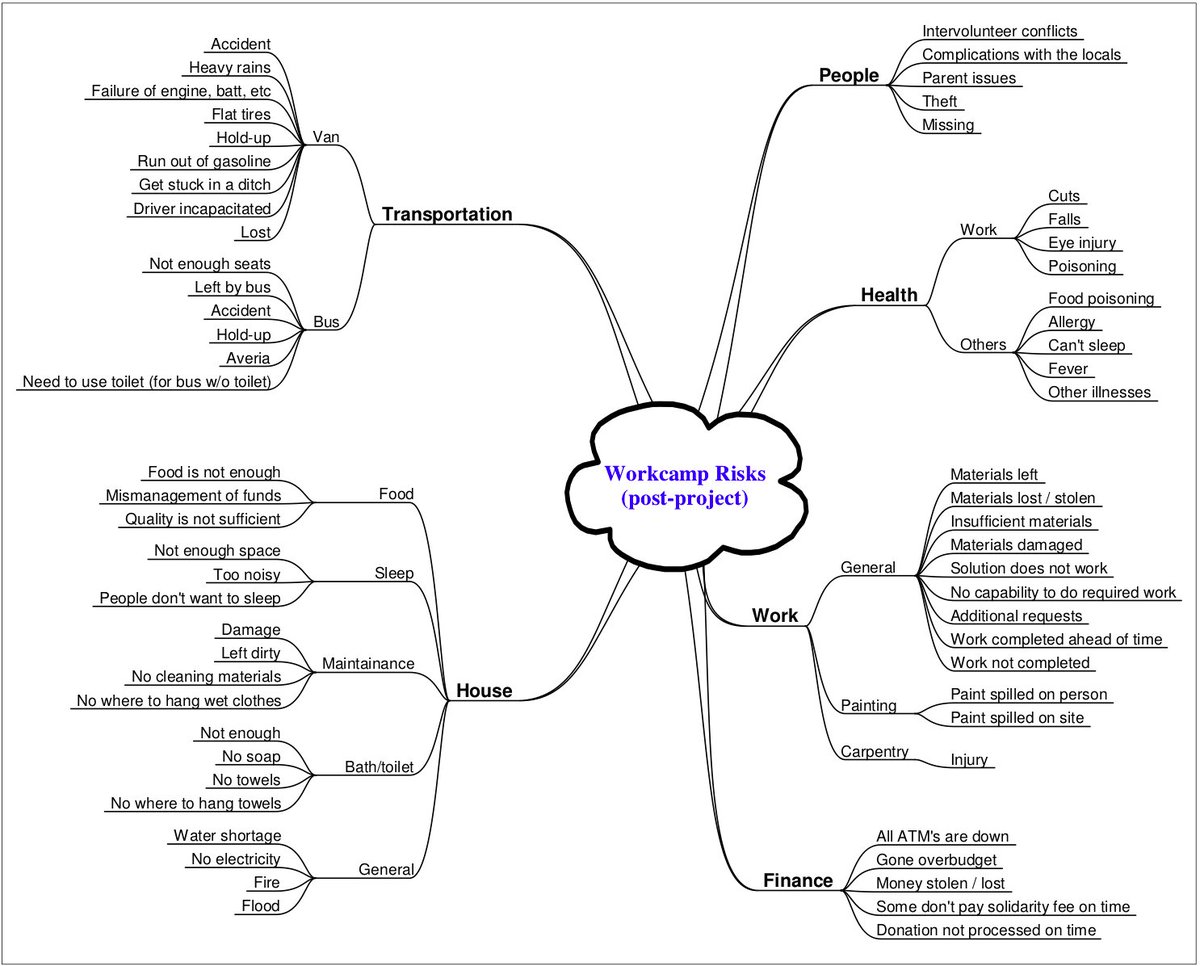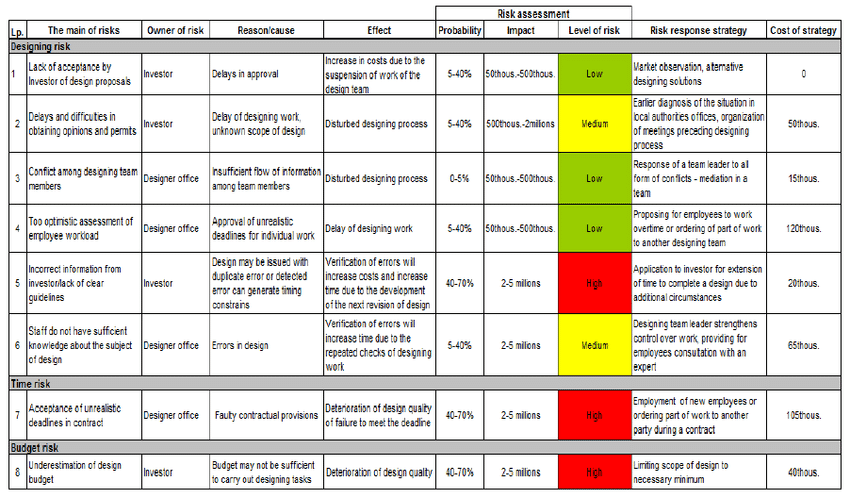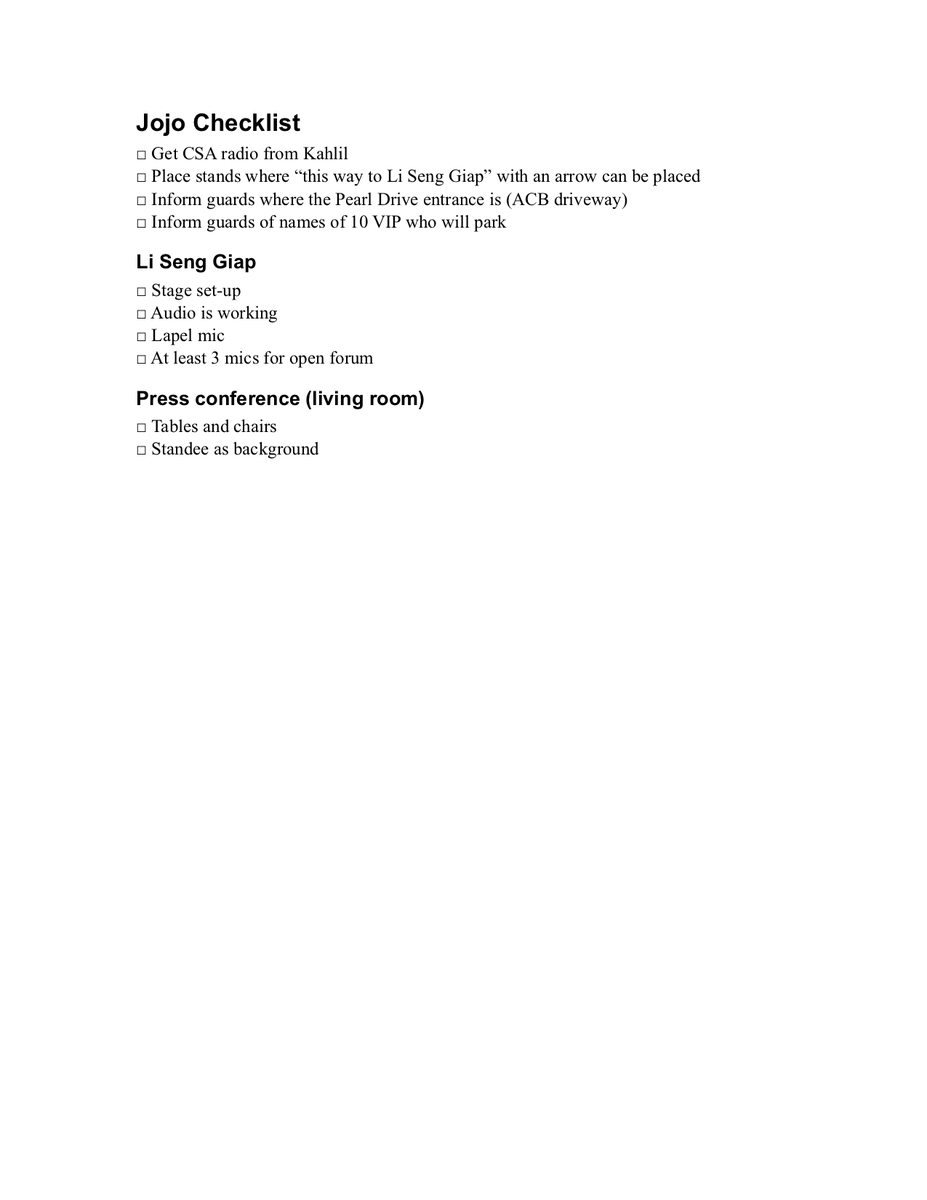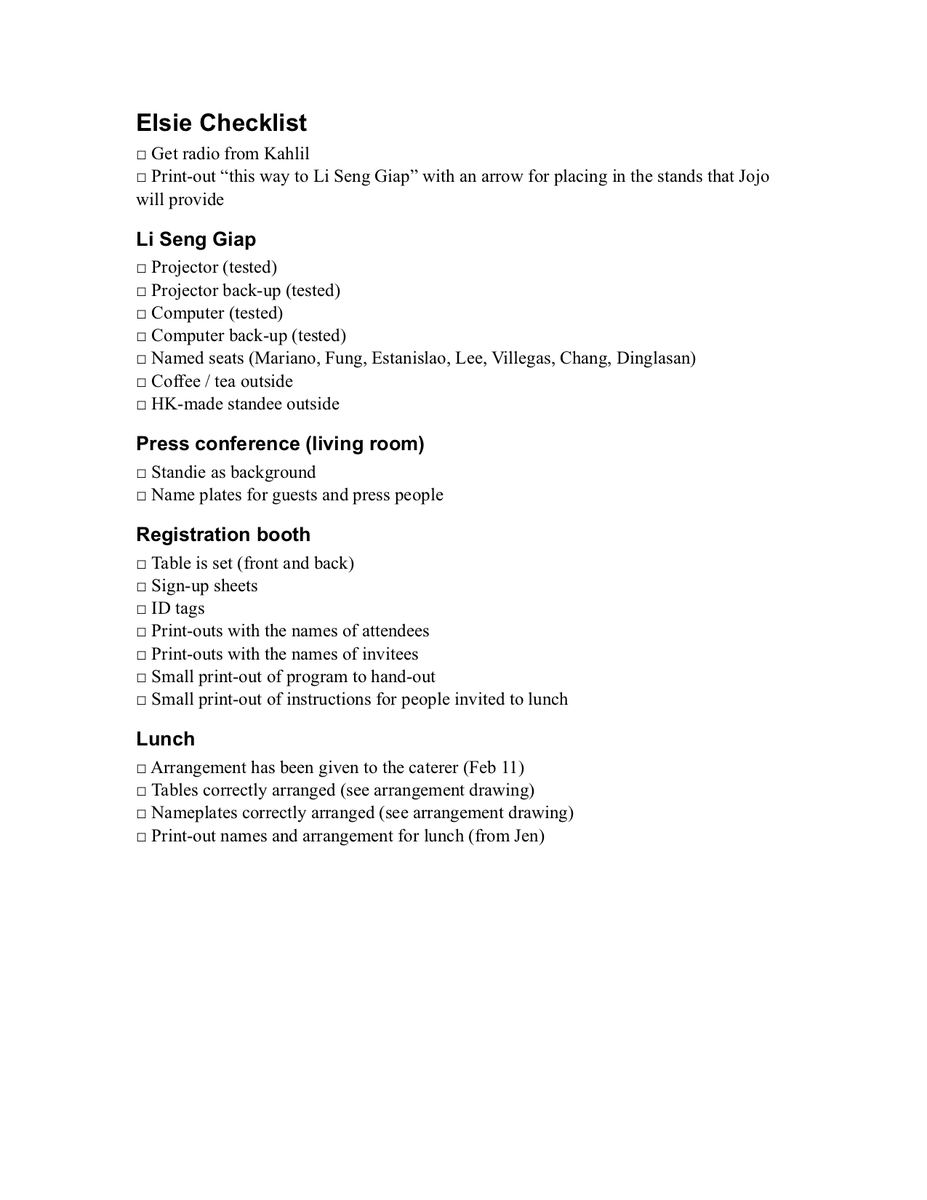1/15 My Favorite Project Management Tools
I& #39;m a long-time PMP (Project Management Professional - a certification from @PMInstitute). I& #39;ve used PM for building a business (and not going insane) and for volunteer work.
These are the most used tools in my PM toolbox.
I& #39;m a long-time PMP (Project Management Professional - a certification from @PMInstitute). I& #39;ve used PM for building a business (and not going insane) and for volunteer work.
These are the most used tools in my PM toolbox.
2/ Note that these tools are for executing known solutions to known problems. If either the solution or the problem is unknown, I use other tools (eg, Customer Development a la @sgblank)
3/ This has been especially useful for me because I& #39;m not a naturally orderly person. This has its advantages, but managing projects is not one of them. These tools give me a way to get projects done without having to make my mind rigid.
4/ Here are my top 5, which I will talk about in this thread:
 https://abs.twimg.com/emoji/v2/... draggable="false" alt="🔹" title="Small blue diamond" aria-label="Emoji: Small blue diamond">Work breakdown structure (WBS)
https://abs.twimg.com/emoji/v2/... draggable="false" alt="🔹" title="Small blue diamond" aria-label="Emoji: Small blue diamond">Work breakdown structure (WBS)
 https://abs.twimg.com/emoji/v2/... draggable="false" alt="🔹" title="Small blue diamond" aria-label="Emoji: Small blue diamond">Project charter
https://abs.twimg.com/emoji/v2/... draggable="false" alt="🔹" title="Small blue diamond" aria-label="Emoji: Small blue diamond">Project charter
 https://abs.twimg.com/emoji/v2/... draggable="false" alt="🔹" title="Small blue diamond" aria-label="Emoji: Small blue diamond">Risk breakdown structure (RBS)
https://abs.twimg.com/emoji/v2/... draggable="false" alt="🔹" title="Small blue diamond" aria-label="Emoji: Small blue diamond">Risk breakdown structure (RBS)
 https://abs.twimg.com/emoji/v2/... draggable="false" alt="🔹" title="Small blue diamond" aria-label="Emoji: Small blue diamond">Risk register
https://abs.twimg.com/emoji/v2/... draggable="false" alt="🔹" title="Small blue diamond" aria-label="Emoji: Small blue diamond">Risk register
 https://abs.twimg.com/emoji/v2/... draggable="false" alt="🔹" title="Small blue diamond" aria-label="Emoji: Small blue diamond">Quality checklists
https://abs.twimg.com/emoji/v2/... draggable="false" alt="🔹" title="Small blue diamond" aria-label="Emoji: Small blue diamond">Quality checklists
5/ I draft a WBS even before starting a project. The draft helps me get a feel of the project and to create the project charter.
I like using mindmaps for the WBS. Here& #39;s one for an event.
I like using mindmaps for the WBS. Here& #39;s one for an event.
6/ What& #39;s the smart way to create a WBS?
 https://abs.twimg.com/emoji/v2/... draggable="false" alt="🔹" title="Small blue diamond" aria-label="Emoji: Small blue diamond">Look at past WBSs / reports
https://abs.twimg.com/emoji/v2/... draggable="false" alt="🔹" title="Small blue diamond" aria-label="Emoji: Small blue diamond">Look at past WBSs / reports
 https://abs.twimg.com/emoji/v2/... draggable="false" alt="🔹" title="Small blue diamond" aria-label="Emoji: Small blue diamond">Talk to PMs who have done similar projects (my fav question: what tasks surprised you?)
https://abs.twimg.com/emoji/v2/... draggable="false" alt="🔹" title="Small blue diamond" aria-label="Emoji: Small blue diamond">Talk to PMs who have done similar projects (my fav question: what tasks surprised you?)
 https://abs.twimg.com/emoji/v2/... draggable="false" alt="🔹" title="Small blue diamond" aria-label="Emoji: Small blue diamond">Organize a workshop with your team (especially for highly technical projects)
https://abs.twimg.com/emoji/v2/... draggable="false" alt="🔹" title="Small blue diamond" aria-label="Emoji: Small blue diamond">Organize a workshop with your team (especially for highly technical projects)
7/ Why is the WBS so great?
 https://abs.twimg.com/emoji/v2/... draggable="false" alt="🔹" title="Small blue diamond" aria-label="Emoji: Small blue diamond">Go through it and highlight things that cost money - you have your cost estimate
https://abs.twimg.com/emoji/v2/... draggable="false" alt="🔹" title="Small blue diamond" aria-label="Emoji: Small blue diamond">Go through it and highlight things that cost money - you have your cost estimate
 https://abs.twimg.com/emoji/v2/... draggable="false" alt="🔹" title="Small blue diamond" aria-label="Emoji: Small blue diamond">Highlight things that require special skills - recruitment plan
https://abs.twimg.com/emoji/v2/... draggable="false" alt="🔹" title="Small blue diamond" aria-label="Emoji: Small blue diamond">Highlight things that require special skills - recruitment plan
 https://abs.twimg.com/emoji/v2/... draggable="false" alt="🔹" title="Small blue diamond" aria-label="Emoji: Small blue diamond">Highlight things that could go wrong - start of risk identification
https://abs.twimg.com/emoji/v2/... draggable="false" alt="🔹" title="Small blue diamond" aria-label="Emoji: Small blue diamond">Highlight things that could go wrong - start of risk identification
8/ con& #39;t
 https://abs.twimg.com/emoji/v2/... draggable="false" alt="🔹" title="Small blue diamond" aria-label="Emoji: Small blue diamond">Recolor completed branches to green - nice visual of completion project status as you progress
https://abs.twimg.com/emoji/v2/... draggable="false" alt="🔹" title="Small blue diamond" aria-label="Emoji: Small blue diamond">Recolor completed branches to green - nice visual of completion project status as you progress
 https://abs.twimg.com/emoji/v2/... draggable="false" alt="🔹" title="Small blue diamond" aria-label="Emoji: Small blue diamond">Show to boss or customer - document agreement on project scope
https://abs.twimg.com/emoji/v2/... draggable="false" alt="🔹" title="Small blue diamond" aria-label="Emoji: Small blue diamond">Show to boss or customer - document agreement on project scope
 https://abs.twimg.com/emoji/v2/... draggable="false" alt="🔹" title="Small blue diamond" aria-label="Emoji: Small blue diamond">For projects split between orgs, color code to clarify scope
https://abs.twimg.com/emoji/v2/... draggable="false" alt="🔹" title="Small blue diamond" aria-label="Emoji: Small blue diamond">For projects split between orgs, color code to clarify scope
9/ Don& #39;t just create a project charter for formality. Use it to:
 https://abs.twimg.com/emoji/v2/... draggable="false" alt="🔹" title="Small blue diamond" aria-label="Emoji: Small blue diamond">Sell the project: why it is important: you owe it to your team!
https://abs.twimg.com/emoji/v2/... draggable="false" alt="🔹" title="Small blue diamond" aria-label="Emoji: Small blue diamond">Sell the project: why it is important: you owe it to your team!
 https://abs.twimg.com/emoji/v2/... draggable="false" alt="🔹" title="Small blue diamond" aria-label="Emoji: Small blue diamond">Ensure stakeholders understand what you are promising, what you need from them, high-level risks
https://abs.twimg.com/emoji/v2/... draggable="false" alt="🔹" title="Small blue diamond" aria-label="Emoji: Small blue diamond">Ensure stakeholders understand what you are promising, what you need from them, high-level risks
 https://abs.twimg.com/emoji/v2/... draggable="false" alt="🔹" title="Small blue diamond" aria-label="Emoji: Small blue diamond">Name names: share skin in the game
https://abs.twimg.com/emoji/v2/... draggable="false" alt="🔹" title="Small blue diamond" aria-label="Emoji: Small blue diamond">Name names: share skin in the game
2-page guide:
2-page guide:
10/ The RBS is like the WBS but for risk identification. Also use past experience/documents, interviews with PMs and team workshops to create one. Here& #39;s an example for a volunteer camp. I& #39;ve been reusing this for 10+ years! Risks hardly change.
11/ Transfer these risks in a spreadsheet. Score them in 2 ways: probability and impact. Multiply. The product is your risk score. Now you can prioritize your risks:
 https://abs.twimg.com/emoji/v2/... draggable="false" alt="🔹" title="Small blue diamond" aria-label="Emoji: Small blue diamond">Schedule frequent reviews of top risks
https://abs.twimg.com/emoji/v2/... draggable="false" alt="🔹" title="Small blue diamond" aria-label="Emoji: Small blue diamond">Schedule frequent reviews of top risks
 https://abs.twimg.com/emoji/v2/... draggable="false" alt="🔹" title="Small blue diamond" aria-label="Emoji: Small blue diamond">Less frequent for the rest
https://abs.twimg.com/emoji/v2/... draggable="false" alt="🔹" title="Small blue diamond" aria-label="Emoji: Small blue diamond">Less frequent for the rest
 https://abs.twimg.com/emoji/v2/... draggable="false" alt="🔹" title="Small blue diamond" aria-label="Emoji: Small blue diamond">Ignore what you can
https://abs.twimg.com/emoji/v2/... draggable="false" alt="🔹" title="Small blue diamond" aria-label="Emoji: Small blue diamond">Ignore what you can
12/ Plan mitigation: lessen probability or impact. Create plan B: contingencies. Put them in columns. Use experience (yours and other& #39;s), documents, workshops. You now have a risk register! Update your WBS with the work needed for contingencies and mitigation *that you accept*
13/ Best quality management tool: checklists. Make them when it makes sense (eg, readiness for an event, things to bring to a location.) Agree with the checklist owner. Schedule when to do a checklist review.
14/ Last tip: Project Time Management = Team Focus Management. Use your calendar, bar/gantt chart, milestone table for your own bird& #39;s eye view. Do your team a favor and just feed them what to focus on for the week.
15/ I wrote this thread to prepare for a PM training for my @JustOneGiantLab team via Zoom in the next couple of weeks. If you want to join, just sign-up here: https://docs.google.com/forms/d/e/1FAIpQLSexawJmleP4eHgDrsFwNN2xr3CXl98YrrXOwrrvUPMBBO2xGA/viewform?usp=sf_link">https://docs.google.com/forms/d/e...

 Read on Twitter
Read on Twitter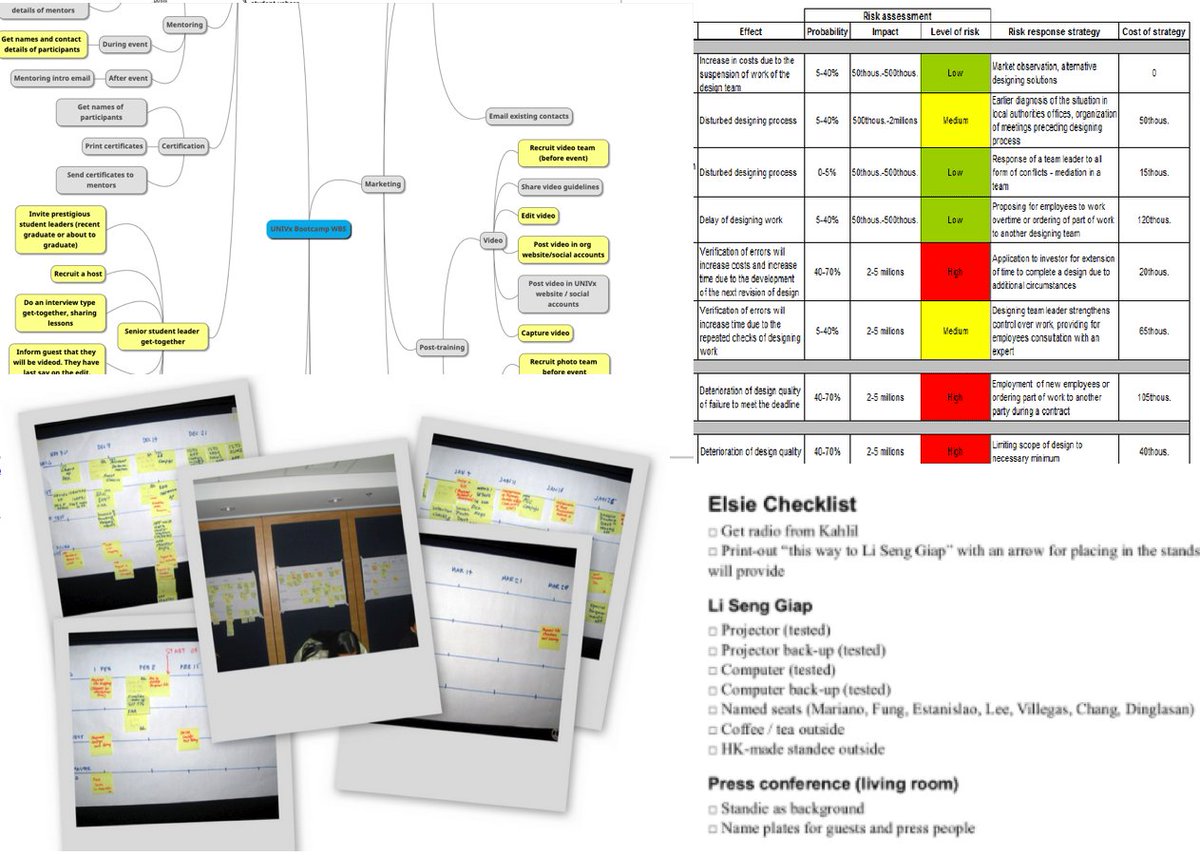
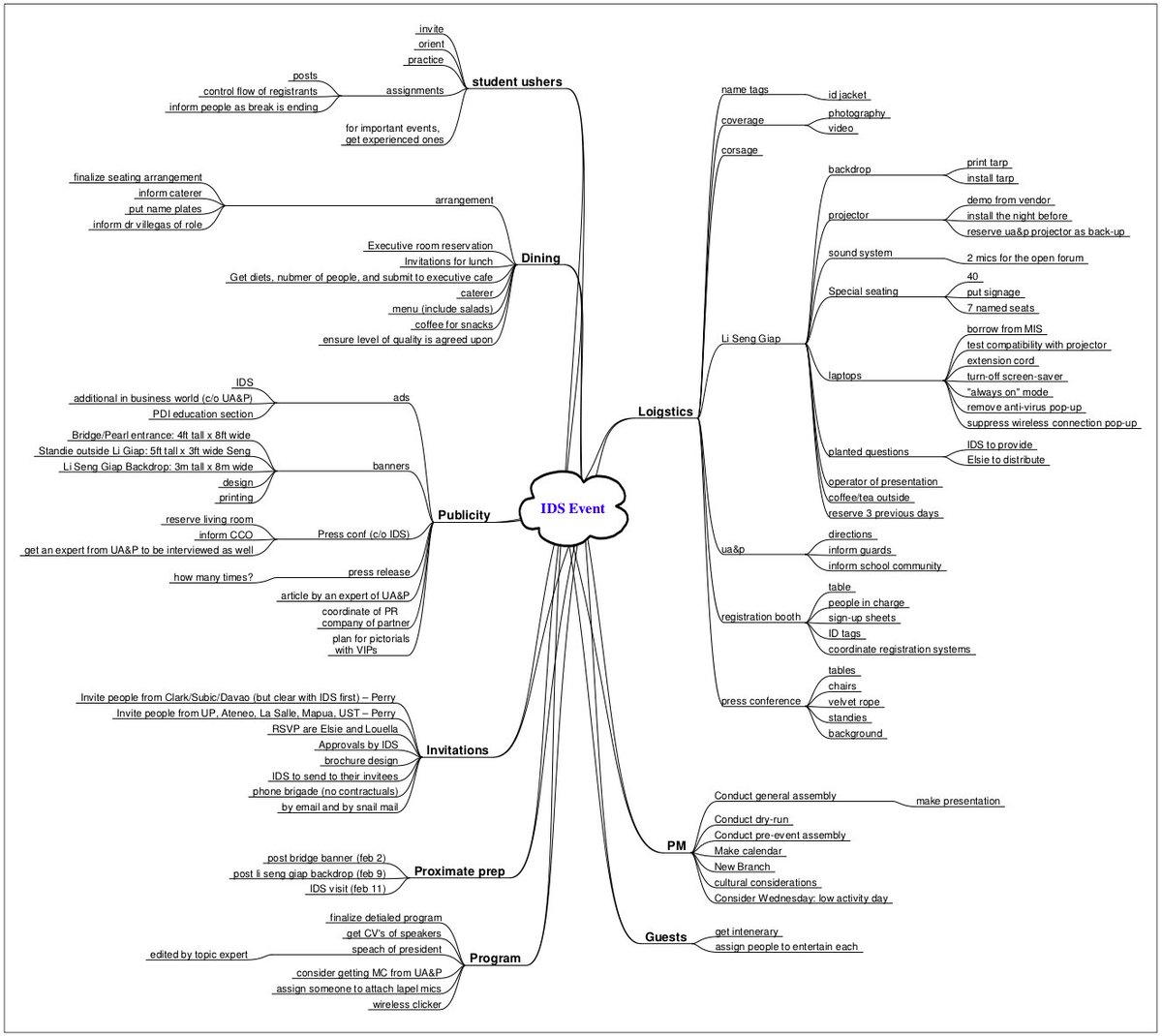
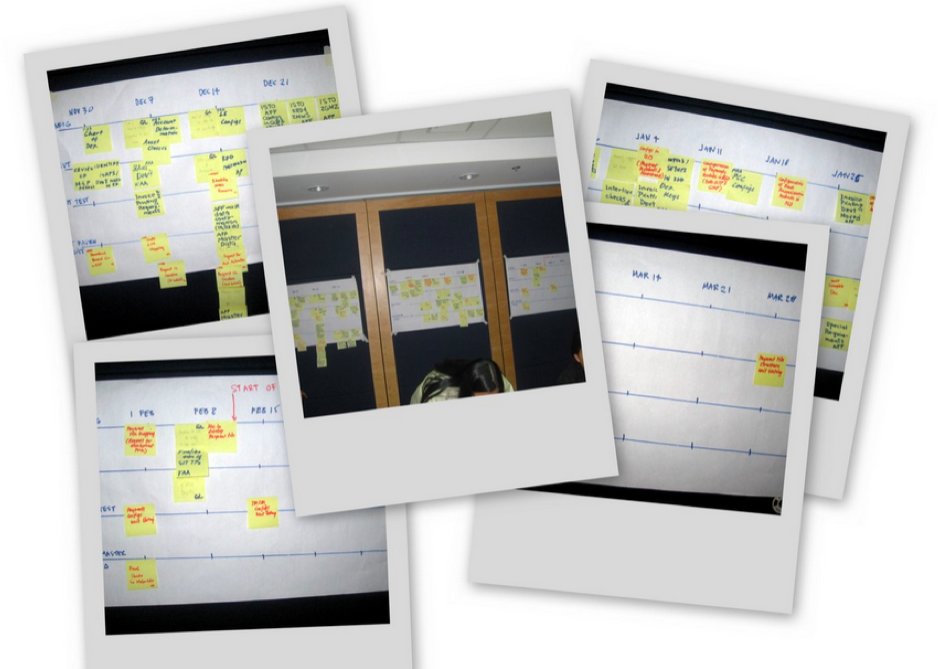 Look at past WBSs / reportshttps://abs.twimg.com/emoji/v2/... draggable="false" alt="🔹" title="Small blue diamond" aria-label="Emoji: Small blue diamond">Talk to PMs who have done similar projects (my fav question: what tasks surprised you?)https://abs.twimg.com/emoji/v2/... draggable="false" alt="🔹" title="Small blue diamond" aria-label="Emoji: Small blue diamond">Organize a workshop with your team (especially for highly technical projects)" title="6/ What& #39;s the smart way to create a WBS?https://abs.twimg.com/emoji/v2/... draggable="false" alt="🔹" title="Small blue diamond" aria-label="Emoji: Small blue diamond">Look at past WBSs / reportshttps://abs.twimg.com/emoji/v2/... draggable="false" alt="🔹" title="Small blue diamond" aria-label="Emoji: Small blue diamond">Talk to PMs who have done similar projects (my fav question: what tasks surprised you?)https://abs.twimg.com/emoji/v2/... draggable="false" alt="🔹" title="Small blue diamond" aria-label="Emoji: Small blue diamond">Organize a workshop with your team (especially for highly technical projects)" class="img-responsive" style="max-width:100%;"/>
Look at past WBSs / reportshttps://abs.twimg.com/emoji/v2/... draggable="false" alt="🔹" title="Small blue diamond" aria-label="Emoji: Small blue diamond">Talk to PMs who have done similar projects (my fav question: what tasks surprised you?)https://abs.twimg.com/emoji/v2/... draggable="false" alt="🔹" title="Small blue diamond" aria-label="Emoji: Small blue diamond">Organize a workshop with your team (especially for highly technical projects)" title="6/ What& #39;s the smart way to create a WBS?https://abs.twimg.com/emoji/v2/... draggable="false" alt="🔹" title="Small blue diamond" aria-label="Emoji: Small blue diamond">Look at past WBSs / reportshttps://abs.twimg.com/emoji/v2/... draggable="false" alt="🔹" title="Small blue diamond" aria-label="Emoji: Small blue diamond">Talk to PMs who have done similar projects (my fav question: what tasks surprised you?)https://abs.twimg.com/emoji/v2/... draggable="false" alt="🔹" title="Small blue diamond" aria-label="Emoji: Small blue diamond">Organize a workshop with your team (especially for highly technical projects)" class="img-responsive" style="max-width:100%;"/>
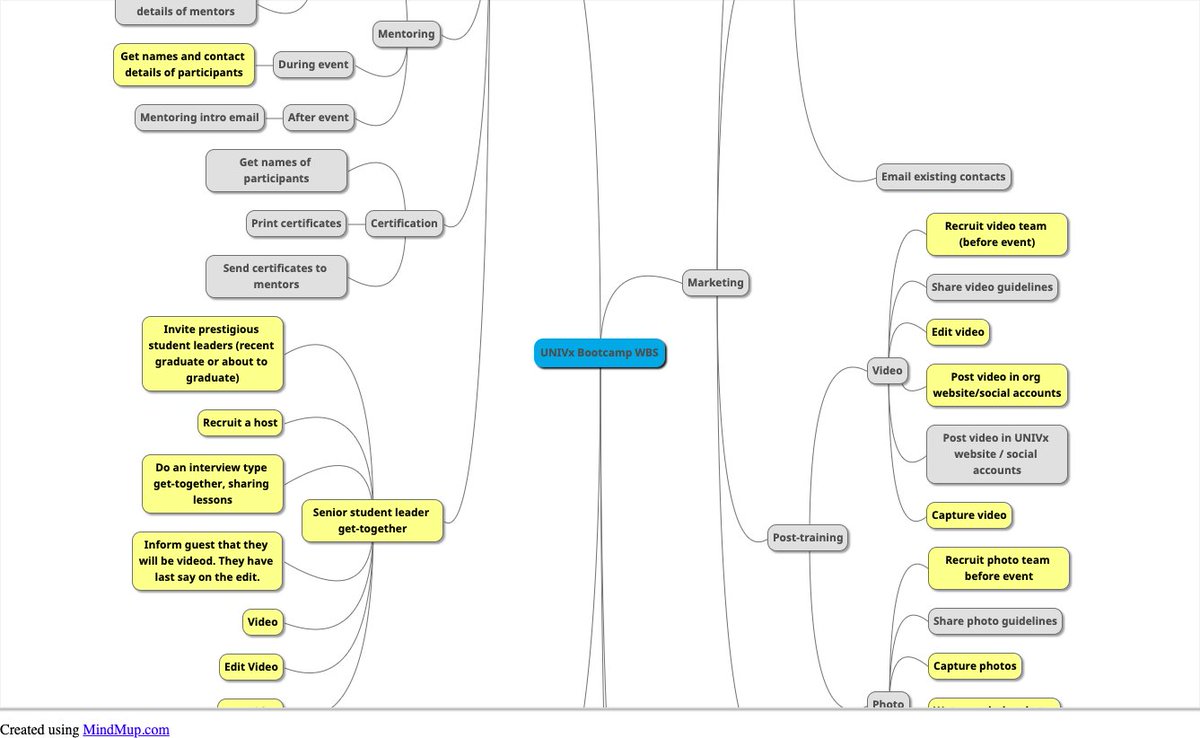 Recolor completed branches to green - nice visual of completion project status as you progresshttps://abs.twimg.com/emoji/v2/... draggable="false" alt="🔹" title="Small blue diamond" aria-label="Emoji: Small blue diamond">Show to boss or customer - document agreement on project scopehttps://abs.twimg.com/emoji/v2/... draggable="false" alt="🔹" title="Small blue diamond" aria-label="Emoji: Small blue diamond">For projects split between orgs, color code to clarify scope" title="8/ con& #39;thttps://abs.twimg.com/emoji/v2/... draggable="false" alt="🔹" title="Small blue diamond" aria-label="Emoji: Small blue diamond">Recolor completed branches to green - nice visual of completion project status as you progresshttps://abs.twimg.com/emoji/v2/... draggable="false" alt="🔹" title="Small blue diamond" aria-label="Emoji: Small blue diamond">Show to boss or customer - document agreement on project scopehttps://abs.twimg.com/emoji/v2/... draggable="false" alt="🔹" title="Small blue diamond" aria-label="Emoji: Small blue diamond">For projects split between orgs, color code to clarify scope" class="img-responsive" style="max-width:100%;"/>
Recolor completed branches to green - nice visual of completion project status as you progresshttps://abs.twimg.com/emoji/v2/... draggable="false" alt="🔹" title="Small blue diamond" aria-label="Emoji: Small blue diamond">Show to boss or customer - document agreement on project scopehttps://abs.twimg.com/emoji/v2/... draggable="false" alt="🔹" title="Small blue diamond" aria-label="Emoji: Small blue diamond">For projects split between orgs, color code to clarify scope" title="8/ con& #39;thttps://abs.twimg.com/emoji/v2/... draggable="false" alt="🔹" title="Small blue diamond" aria-label="Emoji: Small blue diamond">Recolor completed branches to green - nice visual of completion project status as you progresshttps://abs.twimg.com/emoji/v2/... draggable="false" alt="🔹" title="Small blue diamond" aria-label="Emoji: Small blue diamond">Show to boss or customer - document agreement on project scopehttps://abs.twimg.com/emoji/v2/... draggable="false" alt="🔹" title="Small blue diamond" aria-label="Emoji: Small blue diamond">For projects split between orgs, color code to clarify scope" class="img-responsive" style="max-width:100%;"/>
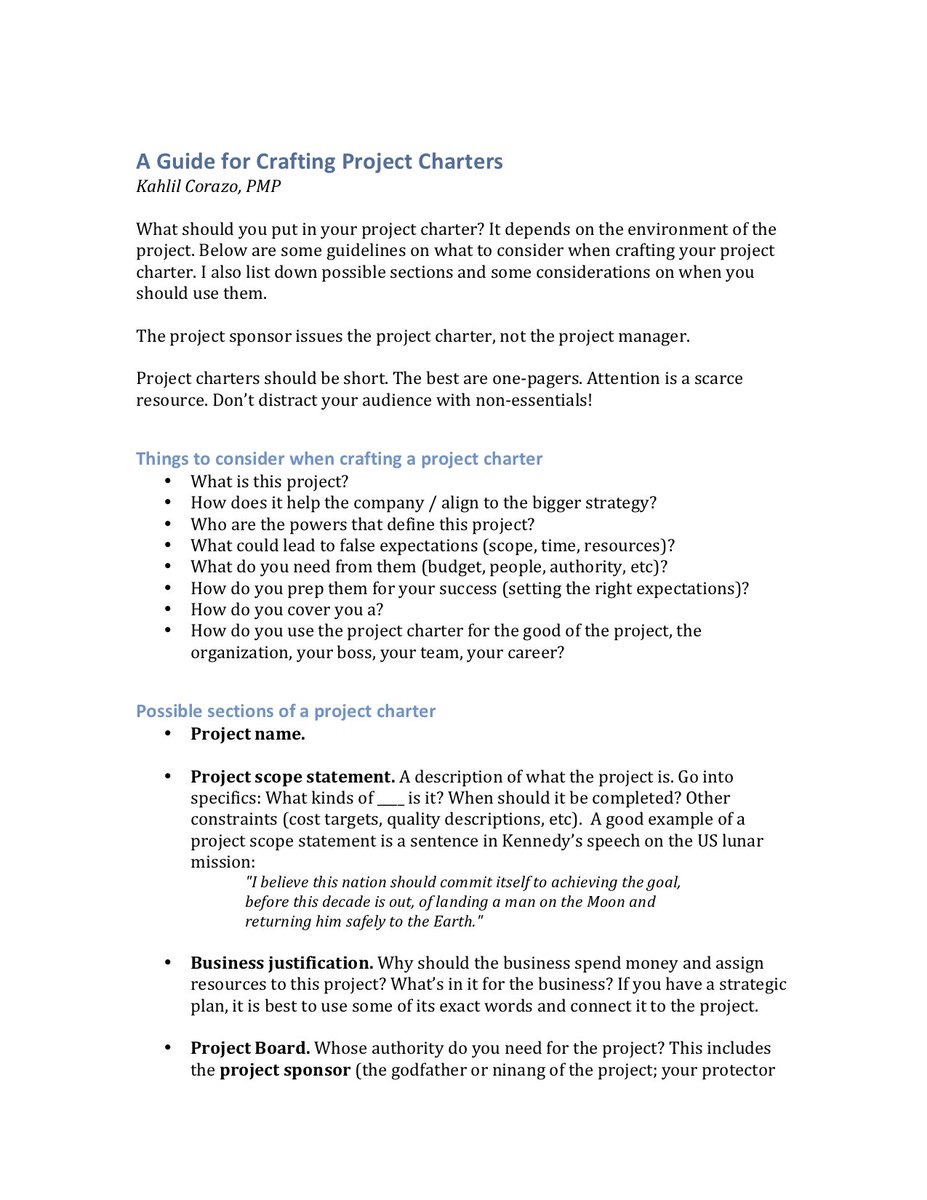 Sell the project: why it is important: you owe it to your team!https://abs.twimg.com/emoji/v2/... draggable="false" alt="🔹" title="Small blue diamond" aria-label="Emoji: Small blue diamond">Ensure stakeholders understand what you are promising, what you need from them, high-level riskshttps://abs.twimg.com/emoji/v2/... draggable="false" alt="🔹" title="Small blue diamond" aria-label="Emoji: Small blue diamond">Name names: share skin in the game2-page guide:" title="9/ Don& #39;t just create a project charter for formality. Use it to:https://abs.twimg.com/emoji/v2/... draggable="false" alt="🔹" title="Small blue diamond" aria-label="Emoji: Small blue diamond">Sell the project: why it is important: you owe it to your team!https://abs.twimg.com/emoji/v2/... draggable="false" alt="🔹" title="Small blue diamond" aria-label="Emoji: Small blue diamond">Ensure stakeholders understand what you are promising, what you need from them, high-level riskshttps://abs.twimg.com/emoji/v2/... draggable="false" alt="🔹" title="Small blue diamond" aria-label="Emoji: Small blue diamond">Name names: share skin in the game2-page guide:">
Sell the project: why it is important: you owe it to your team!https://abs.twimg.com/emoji/v2/... draggable="false" alt="🔹" title="Small blue diamond" aria-label="Emoji: Small blue diamond">Ensure stakeholders understand what you are promising, what you need from them, high-level riskshttps://abs.twimg.com/emoji/v2/... draggable="false" alt="🔹" title="Small blue diamond" aria-label="Emoji: Small blue diamond">Name names: share skin in the game2-page guide:" title="9/ Don& #39;t just create a project charter for formality. Use it to:https://abs.twimg.com/emoji/v2/... draggable="false" alt="🔹" title="Small blue diamond" aria-label="Emoji: Small blue diamond">Sell the project: why it is important: you owe it to your team!https://abs.twimg.com/emoji/v2/... draggable="false" alt="🔹" title="Small blue diamond" aria-label="Emoji: Small blue diamond">Ensure stakeholders understand what you are promising, what you need from them, high-level riskshttps://abs.twimg.com/emoji/v2/... draggable="false" alt="🔹" title="Small blue diamond" aria-label="Emoji: Small blue diamond">Name names: share skin in the game2-page guide:">
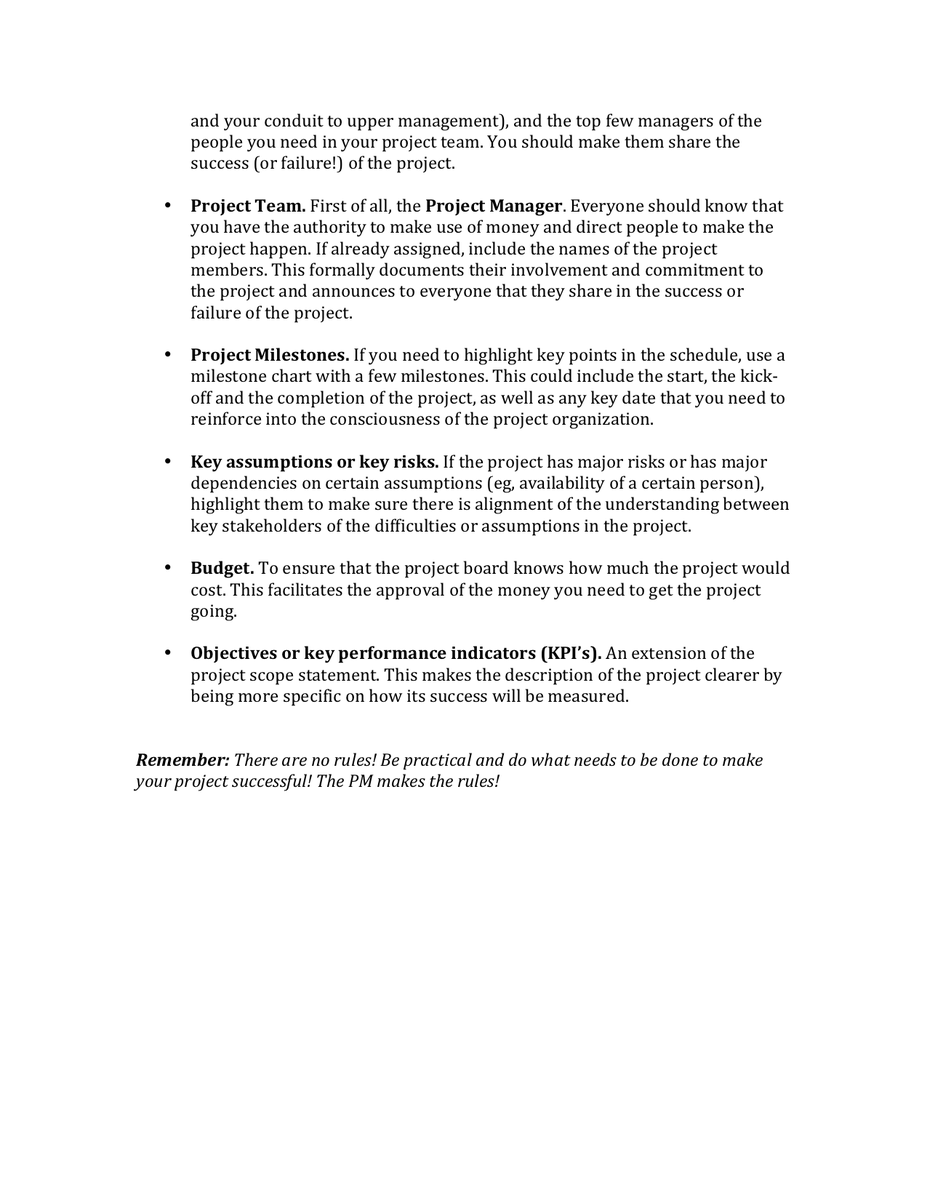 Sell the project: why it is important: you owe it to your team!https://abs.twimg.com/emoji/v2/... draggable="false" alt="🔹" title="Small blue diamond" aria-label="Emoji: Small blue diamond">Ensure stakeholders understand what you are promising, what you need from them, high-level riskshttps://abs.twimg.com/emoji/v2/... draggable="false" alt="🔹" title="Small blue diamond" aria-label="Emoji: Small blue diamond">Name names: share skin in the game2-page guide:" title="9/ Don& #39;t just create a project charter for formality. Use it to:https://abs.twimg.com/emoji/v2/... draggable="false" alt="🔹" title="Small blue diamond" aria-label="Emoji: Small blue diamond">Sell the project: why it is important: you owe it to your team!https://abs.twimg.com/emoji/v2/... draggable="false" alt="🔹" title="Small blue diamond" aria-label="Emoji: Small blue diamond">Ensure stakeholders understand what you are promising, what you need from them, high-level riskshttps://abs.twimg.com/emoji/v2/... draggable="false" alt="🔹" title="Small blue diamond" aria-label="Emoji: Small blue diamond">Name names: share skin in the game2-page guide:">
Sell the project: why it is important: you owe it to your team!https://abs.twimg.com/emoji/v2/... draggable="false" alt="🔹" title="Small blue diamond" aria-label="Emoji: Small blue diamond">Ensure stakeholders understand what you are promising, what you need from them, high-level riskshttps://abs.twimg.com/emoji/v2/... draggable="false" alt="🔹" title="Small blue diamond" aria-label="Emoji: Small blue diamond">Name names: share skin in the game2-page guide:" title="9/ Don& #39;t just create a project charter for formality. Use it to:https://abs.twimg.com/emoji/v2/... draggable="false" alt="🔹" title="Small blue diamond" aria-label="Emoji: Small blue diamond">Sell the project: why it is important: you owe it to your team!https://abs.twimg.com/emoji/v2/... draggable="false" alt="🔹" title="Small blue diamond" aria-label="Emoji: Small blue diamond">Ensure stakeholders understand what you are promising, what you need from them, high-level riskshttps://abs.twimg.com/emoji/v2/... draggable="false" alt="🔹" title="Small blue diamond" aria-label="Emoji: Small blue diamond">Name names: share skin in the game2-page guide:">
